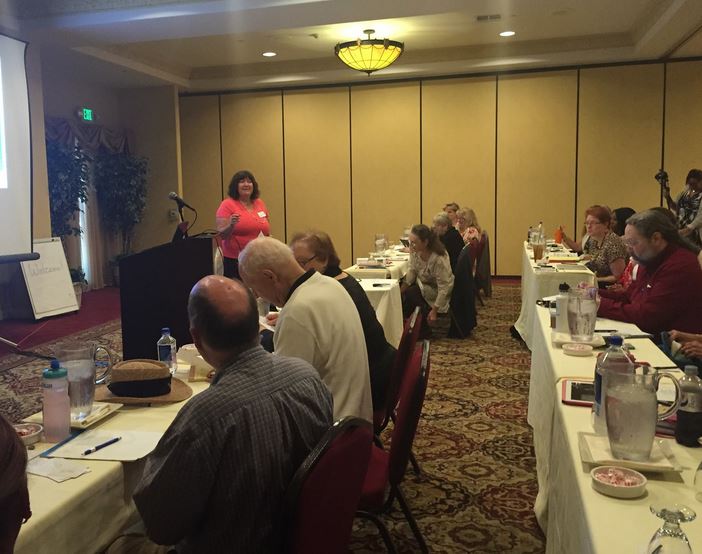 Everyone Benefits from Public Speaking… So Stop Hiding!
Everyone Benefits from Public Speaking… So Stop Hiding!
The first time I felt the fear of public speaking was in 2006. I had joined my local Rotary Club and someone thrust the microphone into my hands so I could share the details of the community project we were participating in the following weekend. My face and ears were hot, the room was spinning, and I knew that everyone was staring at me. If public speaking can change your life, perhaps I’ll pass for now, I thought.
I mumbled something, then closed my eyes and held the mic out to the side before someone took it from me. It was a horrible feeling and in that moment I promised myself I would never speak in front of others again. Yet, just a few weeks later I was in front of the microphone once again as the Rotary Club’s guest speaker. Why? Because in the interim I had figured out that public speaking can change your life and that was exactly what I wanted.
When people think about public speaking, they often imagine Tony Robbins mic’d up on stage rallying large groups of people to make shifts in their lives. Grand scale public speaking has its place, but there is much more to public speaking. Public speaking skills benefit everyone whether you’re talking to five people or five thousand.
Public Speaking Evokes Fear
It’s reported that 25% of people are more afraid of public speaking than anything else, including heights. Public speaking can trigger the fight, flight, or freeze response which is an emotional and physical reaction to fear. If you fall into this category, you may find yourself hiding whenever public speaking is required.
Even Public Speakers Feel Afraid
You may be surprised to learn that nearly everyone suffers from fear of speaking or ‘stage fright’ from time to time, even seasoned speakers. Given the right set of circumstances, everyone deals with feelings of intimidation, imposter syndrome, and resistance to public speaking. It’s completely natural to feel unnatural in the spotlight, but developing skills for effective public speaking benefit everyone and shouldn’t be avoided out of fear.
Public Speaking Has Benefits
Public speaking is more than feeling comfortable presenting in front of others. Public speaking helps convey important information, educate, influence, and entertain others all the while improving critical thinking skills, communication skills, and boosting confidence.
Good public speakers have a greater command over their listening skills, ability to debate and argue effectively, and tend to be more likeable. They are less likely to be negatively influenced by others and tend to be less emotionally reactive to stress.
You’ve Got to Start Somewhere
You don’t have to start off on a platform to become comfortable public speaking. You can start small by practicing public speaking soft skills in everyday life. It’s as simple as engaging the clerk at the store or in the drive thru window. Good public speaking skills are useful everywhere.
Create Public Speaking Goals and Work from There
Determine what success looks like for you. From boosting your confidence at a networking event to leading a group or hosting a workshop, there are many ways to use public speaking to your advantage. Once you set a goal, focus on the skills needed to reach it. From there, you can adjust your goals higher or revel in the success of being more comfortable with public speaking overall.
Three Reasons You May Fear Public Speaking- and What to do About Them
Fear of public speaking is common and frankly, normal. It can be intimidating standing in front of others educating, entertaining or trying to influence them. A lot can go wrong being in the spotlight and when it happens, it’s petrifying.
There are a variety of reasons you may fear public speaking. Some are unique to your personality and personal experience with speaking, while others may be more universal. Three common reasons people fear public speaking include:
- Feeling Unprepared
- Lacking Confidence
- Inexperience
Each of these reasons are valid and would likely cause anyone to hide and avoid the spotlight, but they can be overcome and used to an advantage.
The Benefits of Preparation and Opportunity– Everyone is an expert on something. If given the opportunity to speak on something they know intimately, they have no problem educating, persuading, or entertaining. Even though they may feel uncomfortable sharing their thoughts in a large group, they feel confident about the topic and content. Being asked to present a topic they aren’t fluent in can cause fear and intimidation where there used to be confidence.
When it comes to public speaking, being prepared is key. The more you know about a subject the less likely you are to shy away from sharing. Additionally, the more rehearsed you are on how to package the information, the less likely you’ll feel intimidated presenting it.
Give yourself ample time to arrange your thoughts and ideas and package them for a group setting. Give consideration to what you want to convey and configure the best way to deliver it. Create a beginning, middle and end to your content and rehearse your presentation in your mind or practice in front of the mirror or someone you trust.
You’ve Got What It Takes- One of the primary reasons people fear public speaking centers on themselves. Speaking while others watch is intimidating and can trigger a heightened sense of self. How others react when we speak can positively or negatively influence how we think things are going. If people seem disinterested or bored, it can wreck our confidence. When they seem engaged and pleased, it boosts confidence.
In the same way it’s important to be prepared with your content, be prepared personally. Dress well, feel confident with your grooming, and prepare to be the center of attention. Work on your non-verbal communication and how you present yourself. Choose clothing that’s appropriate for the situation. Practice speaking or presenting in front of a mirror to look for ways to improve or enhance what you say.
Good public speakers are comfortable with attention and don’t allow others to influence their confidence. While it is important to be able to ‘read the room’ to vibe check, it is also important to realize people are often absorbed with their own thoughts which has nothing to do with you and your presentation. Building confidence in your appearance and authority will boost your confidence in public speaking.
Be Willing to Be Uncomfortable- In order to feel comfortable, you’ve got to be uncomfortable. In the beginning, public speaking will feel awkward and unnatural, but the more often you do it, the more comfortable you’ll become.
Start small with addressing a group of people you know about a topic you are confident in. Push yourself to address people you don’t know or speak to larger groups. Keep at it until you feel confident, and the process normalizes. Then push yourself again towards a new goal.
Repetition creates mastery. The more often you speak on the same subject the more experienced you’ll become. Many speakers deliver the same material to multiple audiences knowing the content will improve over time with repetition.
Non-Threatening Ways to Practice Public Speaking that Won’t Scare You to Death
Imagine signing up for a marathon with no running experience. It would never occur to you to hit the ground running 26.2 miles without practicing first. Going from the couch to the pavement may require walking, jogging, and running shorter distances in order to build up to a marathon. It’s the same with public speaking.
Becoming more comfortable with public speaking is easier when you get plenty of practice and there are many ways to get practice that’s less intimidating than facing large crowds.
If one of the main reasons you avoid public speaking includes fear, here are some non-threatening ways to practice and build your confidence and mastery.
Join Toastmasters – Toastmasters international is a non-profit educational organization that teaches public speaking skills. There are chapters everywhere where local people meet to learn, support, and build their confidence with public speaking. Since everyone is there to learn, it is far less intimidating and easier to practice in a supportive environment.
Engage with Others – It may seem simple, but engaging with others in a meaningful way helps practice for public speaking. When checking out at the store, look the clerk in the eye and engage with them for a brief, but meaningful moment. Compliment a stranger or engage someone while standing in line. Taking the lead on engagement can boost confidence and make it easier to address audiences.
Practice smiling – Non-verbal communication is a key element of public speaking. The cues you send to others help them receive your information. Practice smiling at people and making eye contact. Also, smile when speaking on the phone. The act of smiling when talking boosts likeability because the smile comes through to the listener even when they can’t see you.
Start a YouTube channel – It’s easier to speak when no one is watching. Consider using social media as a way to get comfortable speaking. Create videos to showcase your knowledge without the fears that come from standing in front of others. Practice your presence, delivery, and non-verbal communication until you feel ready to address people in person.
Coach, lead or teach – Find ways to lead others on a small scale. Become a sports coach for your child’s team, lead a small group, or teach a class. The experience will help you uncover your strengths and areas you need to boost confidence and mastery.
Top Tips for Getting More Comfortable with Public Speaking
Let’s face it, public speaking can be incredibly uncomfortable. Having all eyes on you is intimidating and can leave you shaking in your shoes. Even the most seasoned public speaker deals with the jitters from time to time.
If you’re new to public speaking, it will take time getting more comfortable with public speaking. Here are some tips that help-
Top Tip: Know your material- It won’t matter how confident you are if you don’t know your material. Being underprepared is a surefire way to struggle with public speaking. The better you know your material, the easier it is to deliver. Spend ample time practicing and you’ll feel more in control when you are speaking.
Top Tip: Stand up, shoulders back- Ever hear of the power stance? It’s a way of standing that sends signals to the brain that you feel confident and capable. A Power stance is achieved by standing tall, head held high, shoulders back and feet shoulder width apart. Think of standing superhero style, it will help you feel more in control.
Top Tip: Embrace the pregnant pause: When we feel nervous, we tend to talk too much. Public speaking is more effective when there are natural breaks in the rhythm. Also, this allows you to think as you speak. Before speaking, take a moment to gather yourself and take a few breaths before you begin. If you find yourself drawing a blank, don’t worry, give yourself time to regain your train of thought and move on.
Top Tip: Use storytelling for engagement: Story telling is an excellent way to build rapport and generate interest. Incorporate a story or two into your content to make it more personal and feel more conversational.
Top Tip: Look to the back of the room: If you find yourself feeling overwhelmed, find a focal point or two at the back of the room. Rather than look someone in the eye, look above and beyond the group or audience until you begin to feel confident.
Top Tip: Find an avatar: In marketing, an avatar is an ideal customer who wants what you have to sell. When speaking in public, look for one person you feel confident and comfortable speaking to. It may be someone who is looking at you and smiling or someone who reminds you of someone you know and like. Public speaking can change your life if you’re willing to be creative. Imagine you are speaking directly to them to help ease tensions and boost confidence.
Top Tip: Know your strengths and challenges: If you struggle with where to place your hands, consider speaking from a podium or holding something while you speak. If you feel like a million bucks in a suit, wear your best one to deliver your content. Use your strengths to your advantage and find workarounds for your challenges.
Public Speaking Can Change Your Life… Opportunities for People Who Hate Public Speaking
You may not have plans to use public speaking all the time, but there is still value in being able to command a group or audience. Good public speakers influence, entertain, and educate others with ease, no matter how small their audience is. Whether you want to make public speaking a routine part of your career, or need skills for an occasional reason, you’ll need practice to sharpen your skills.
There are lots of opportunities for public speaking that don’t include being on stage or in front of large groups. Look for small-scale options to get some solid practice. Public speaking can change your life if you make the most of what is already in front of you. Try these ideas…
Become a tour guide – Leading tours is a great way to practice delivering content without feeling overwhelmed, especially if the subject matter is of personal interest. Finding ways to volunteer as a tour guide can put you in front of hundreds of people, one small group at a time.
Lead a meeting – Meetings are a great way to practice delivering content. Whether formal or informal, a meeting can be a great opportunity for sharing audio-visual content and practicing presentation skills. Meetings don’t have to be limited to work-related content. Community events, faith-based, or civic opportunities are everywhere.
Be a guest – If you hate public speaking and being a one-man show, consider being a guest on a podcast, webinar, or workshop. Interview formats are a great way to showcase your talents and content without having to formalize your speech. Interviews are often more conversational and can be a great way to share information without feeling overwhelmed. While public speaking can change your life, do it on your terms.
Join the library – Most libraries host a variety of events and are often looking for community members to volunteer their time and talents. Practice speaking by hosting an information night, teaching a hobby or class, or leading a group.
Get behind a cause – Everyone has something they are passionate about. Partnering with a cause that matters to you can help you give back and create opportunities to practice public speaking. Offer to do trainings or informational talks about the organization in the community.
Go back to school – Many colleges and universities welcome community members who enrich coursework with their expertise or real-world experience. Approach a local school about speaking to a class on a subject you are passionate about. Most staff members appreciate the opportunity to offer their students access to unique content and speakers. Using the public speaking can change your life strategy while serving others is an awesome goal.
Have you read “Speakers! The Quick Public Speaking to Business Method: Turning Your Talk into an Ongoing Revenue Stream” I co-authored with Ellen Finkelstein?
And Be Sure to Come Aboard for My Complimentary 7-Day Public Speaking Training!
I’m Wall Street Journal and USA Today bestselling author, independent publisher, and serial entrepreneur Connie Ragen Green and would love to connect with you. If you’re new to the world of online entrepreneurship please check out my training on how to make your first income online at 3 Day eBiz and learn how to gain an unfair advantage when it comes to building a lucrative online business.



Leave a Reply